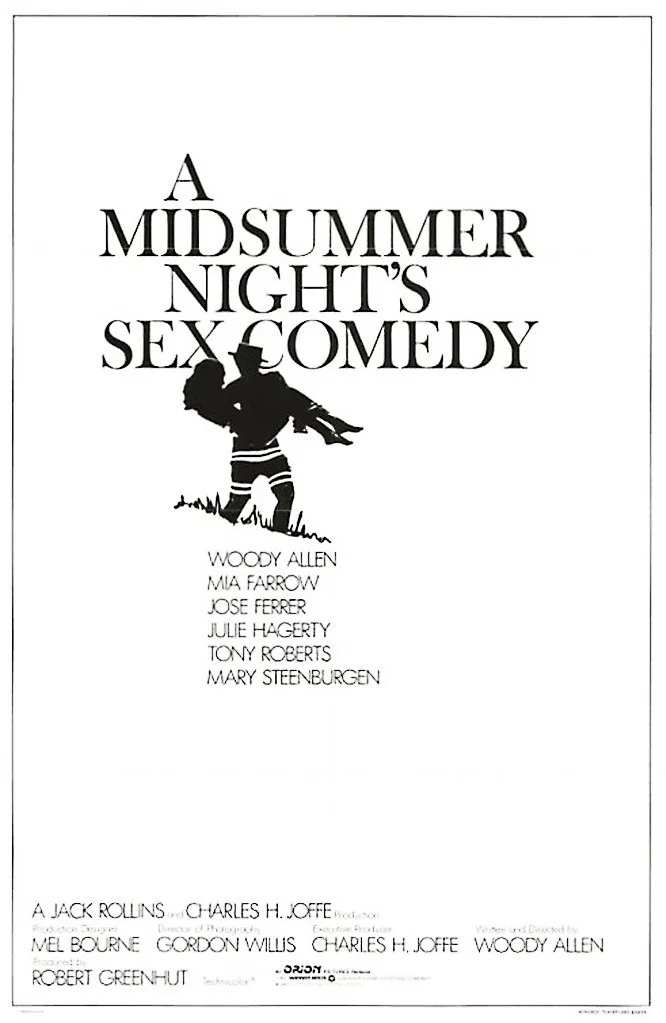The further north you go in summer, the longer the twilight lingers, until night is but a finger drawn between the dusk and the dawn. Such nights in northern climes are times of revelry, when lads and maids frolic in the underbrush to the pipes of Pan. Woody Allen‘s “A Midsummer Night’s Sex Comedy” sneaks up rather suspiciously on this tradition; his men and women are rationalists, belong to such professions as finance, medicine, and psychiatry, and are nonchalant in the face of such modern inventions as flying bicycles. And yet here they all are, out in the country for the weekend. They gather at a little cottage somewhere in upstate New York, arriving by carriage or primitive auto, and in no time at all they are deeply unhappy about each other’s sex lives. The host and hostess are Woody Allen and Mary Steenburgen. He is a stockbroker and she is his shy and sweet wife. The guests include José Ferrer, as an egotistical scientist, Mia Farrow, as his fiancée, Tony Roberts as a doctor, and Julie Hagerty as his abundantly sexed nurse.
During the course of their long weekend, many themes emerge, but the most common one is the enigma of male jealousy. Look at these three men, each one paired with the wonderful woman of his dreams. Allen, a part-time crackpot inventor, has a wife who loyally supports his experiments. Ferrer, an aging genius with a monstrous ego, has a beautiful young woman to hang on his arm. Roberts, an insatiable satyr, has a nubile nurse panting with desire. Are all three men happy and satiated? Not a chance. It is the most inevitable thing in the world that each man should be consumed with lust for one or more of the other women. It is not enough to have a bird in the hand; one must also have another bird in the bush. Or, as Gore Vidal and David Merrick have both observed, “It is not enough for me to succeed. Others must fail.”
From this simple and intriguing little situation, Woody Allen spins a rondelet of sexual intrigue and frustration. The basic developments: Allen pines away with the thought that he could once have made love to Farrow, but declined the chance. Ferrer conspires to meet Hagerty in the woods. Roberts attempts to seduce Farrow. And, through it all, Steenburgen steadfastly hopes for the best from everybody. To pass the time in between assignations and intrigues, the couples picnic, go for walks in the woods and express curiosity in Allen’s latest inventions, which, in addition to the flying bicycle, include a metal sphere that can provide a magic lantern show that remembers the past and foresees the future.
This all sounds very charming and whimsical, and it is almost paralyzingly so. “A Midsummer Night’s Sex Comedy” is so low-key, so sweet and offhand and slight, there are times when it hardly even seems happy to be a movie. I am not quite sure what Allen had in mind when he conceived this material, but in addition to the echoes of Shakespeare and of Bergman’s “Smiles of a Summer Night,” there are suggestions of John Cheever’s Wapshots, Doctorow’s “Ragtime,” and Jean Renoir films in which nice people do nice things to little avail.
This is not a “Woody Allen film,” then. It is not a brash comedy, it does not really contain the Woody Allen persona, and I guess Woody wanted it that way; he says he wants to try new things instead of giving people the same old stuff all the time. It is our misfortune that he arrived at that decision just after making “Annie Hall” and “Manhattan,” two wonderful films that brought his same old stuff to an exciting new plateau.
Now, with “Stardust Memories” and this film, he seems rudderless. I don’t object to “A Midsummer Night’s Sex Comedy” on grounds that it’s different from his earlier films, but on the more fundamental ground that it’s adrift. There doesn’t seem to be a driving idea behind it, a confident tone to give us the sure notion that Allen knows what he wants to do here. It’s a tip-off that the story is lacking in both sex and comedy. If the film seems at a loss to know where to turn next, the ending is particularly unsatisfactory. It involves a moment of fantasy or spirituality in which one of the movie’s most rational characters dies and turns into a spirit of light, and bobs away on the twilight breeze. I don’t object to the development itself, but to the way Allen handles it, so briefly and incompletely that it ends the film with what can only be described as a whimsical anticlimax.
There are nice small moments here and reflective, quiet performances, and a few laughs and smiles. But when we see Woody pedaling furiously to spin the helicopter blades of his flying bicycle, we’re reminded of what we’re missing. Woody doesn’t have to be funny in every shot and he doesn’t have to become another Mel Brooks, but he should allow himself to be funny when he feels like it, without apology, instead of receding into cuteness. I had the feeling during the film that Woody Allen was soft-pedaling his talent, was sitting on his comic gift, was trying to be somebody that he is not — and that, even if he were, would not be half as wonderful a piece of work as the real Woody Allen.



















